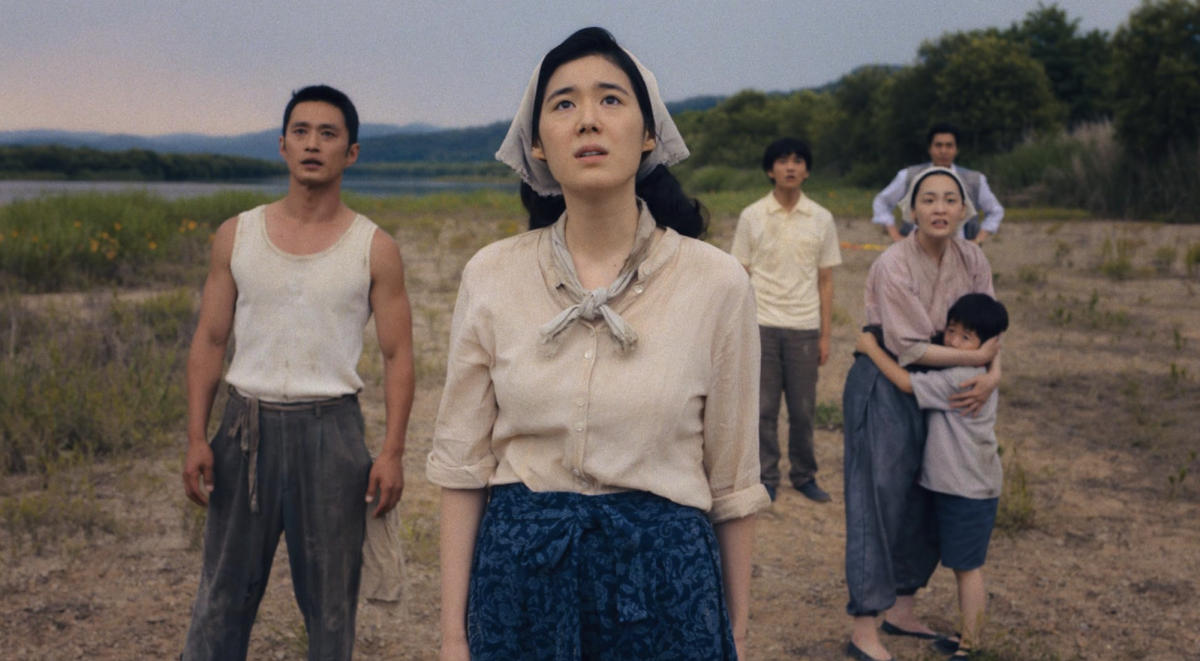
In its best moments, the second season of “Pachinko” is utterly breathtaking. Finding a near seamless balance in its vast story, “Pachinko” is able to effortlessly move through time, across the generations of a family’s history.
The second season jumps to 1945, seven years after the first season’s end. Sunja (Minha Kim) lives with her sister-in-law Kyunghee (Jung Eun-chae) and continues to make a living by selling kimchi — fermented red cabbage — in the streets of Osaka, Japan. As U.S. forces begin to push toward Japan, Sunja is forced to accept the help of Hansu (Lee Min-ho) — a dubious figure from her past — as the family continues to struggle to survive in a war-torn Japan far from their homeland of Korea. The show’s second storyline, which runs parallel to the modern age, begins in 1989, following Solomon (Jin Ha) as he deals with the fallout of his decision to blow a huge business deal. Suffering from a ruined reputation, Solomon’s morals begin to bend in his desperation to prove himself in the high society of Tokyo, where he is an outsider due to his Korean heritage, Japanese childhood and American education.
There is no denying that “Pachinko” is quite an ambitious effort. Covering a generational story is no small feat and somehow the show’s second season seems to come into its own with an even more confident rhythm than its first. While I found that the first season leaned heavily into the grand aspects of this story — filling nearly every moment with the sweeping scenery of the Korean countryside and the chaotic sets of the crowded streets of Osaka — the second season offers another side to the larger-than-life landscapes: the precious intimate moments within.
These smaller moments build an undeniably strong core for this season, like in scenes in the Japanese countryside where Sunja’s family seeks refuge. There are flashes of whimsy, such as when Chang-ho (Kim Sungkyu) — Hansu’s right-hand man — sets up a stakeout to find the chicken coop thief with an excited Mozasu (Eunseong Kwon), Noa (Kim Kang-hoon) and typically reserved Kyunghee in tow. Happiness resides in the intimate family dinners shared under faint candlelight. Love blooms in the light touches and glances between Kyunghee and Chang-ho, while Sunja gains back a bit of independence when Hansu attempts to teach her how to drive. The season doesn’t quite focus on the vast setting that the characters are a part of but rather the little moments that occur within its space.
Additionally, “Pachinko” boasts an incredibly strong ensemble cast. The cast’s passionate performance breathes life into each character, driving the dynamic atmosphere of “Pachinko.”
A particular standout is Minha Kim’s masterful performance of Sunja. As the central character, the actress faces the daunting task of portraying twenty years of Sunja’s life, which she accomplishes with remarkable ease. Her mannerisms and voice carry the weight of hardship and wisdom, capturing the toll of Sunja’s difficult journey. Minha Kim brings depth to moments of both joy and devastation — notably in Sunja’s reunion with her mother after nearly a decade apart, where she imbues the scene with both tenderness and profound sadness. Through Kim’s careful portrayal, Sunja emerges as a bold woman who, despite facing countless obstacles, maintains her capacity for love.
Another standout is Lee Min-ho’s Hansu, whose motivations are often hidden and spurred more so by his personal desires than was initially apparent. Min-ho manages to find the delicate balance between cruelty and compassion in Hansu, blurring the line between the two states to create the complex nature of a man who easily uses violence to gain power yet watches over Sunja’s family and treats her with tender respect. This balance is shown in a scene between Hansu and Yoseb (Han Joon-Woo) — Kyunghee’s husband — whom Hansu rescued from Nagasaki after the atomic bomb. Yoseb’s distaste for Hansu due to his work as part of the yakuza leads Hansu to bitterly hold a mirror to Yoesb’s face, displaying the ruin that the attack had left on Yoseb’s body. In that moment of cruelty, Min-ho’s eyes slowly morph to capture pity for the man who lies in pain helpless and terrified of his own face.
While certain storylines — particularly the ones that operate in 1990s Tokyo — are limited to shorter screen time compared to the first season, the writers always seem to take the chance to treat these moments with the same care as is given to its storylines in 1940s Osaka. Equally compelling are two parallel stories: Solomon’s identity crisis, which deepens into a moral one as he seeks revenge against his former boss, and the elderly Sunja’s (Youn Yuh-jung) journey as she confronts echoes of her past through a newfound friendship with Kato Tatsumi (Jun Kunimura). There is clearly such care put into building the characters and stories that this season feels even more magnetic than the previous iterations. It’s a sort of care that pulls the audience into the world of the writers’ creation and builds genuine connections to this larger-than-life story.
In its sophomore season, “Pachinko” is undeniably as full of passion and life as its first season. The utter care and love which shine through “Pachinko” make it one of the best shows on television and one that deserves to continue to develop its ambitious, familial story to its conclusion.















